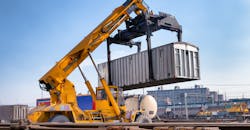Shipping Costs Rise, Transport Tightens as War Escalates in Ukraine
IndustryWeek's elite panel of regular contributors.
The war in Ukraine and sanctions on Russia are creating additional challenges for shippers and manufacturers. What’s at stake and what might happen next?
Transportation Impacts
Conflict tends to increase ocean freight rates across the board, so the transportation cost impact will be widespread. European importers already experience historically high ocean freight rates due to the pandemic. Now ocean rates to Europe are rising again.
The Ukrainian Black Sea port of Odessa is shut down. Cargo destined for Ukraine has been diverted to other ports. Cargo destined for Russia is still moving but may be stopped or diverted as the situation develops.
Rail may not remain a safe or affordable alternative to sea transport because trains from China to Europe typically transit through Russia. War may spread from the Ukraine to neighboring countries, or Russia may slow down or stop rail freight in retaliation for Western actions. Last year, 1.5 million ocean containers of cargo shipped by rail west from China to Europe. Any rail disruption would have an additional dramatic impact on European ocean prices and on available capacity.
People and goods traveling by air have fewer options. Ukrainian airspace is shut down and E.U. airspace has been closed to Russian aircraft.
Export Controls and Trade Sanctions
The U.S imposed an extensive list of trade sanctions and export controls in response to Russia’s invasion of the Ukraine. The restrictions are wide-ranging and target shipments to Russia and Belarus, their banking sectors and other specially designated nationals. Many U.S. companies will need to terminate their shipments or activities immediately. This is particularly true if your company produces U.S. export-controlled items.
Even if your transactions with Russia remain allowed, the new sanctions target the Russian economy and its financial system. You may not be able to get paid for your business activity.
Price and Supply Shocks
Russia and Ukraine produce a large share of the globe’s energy, food and specialty metals and gases. The invasion has caused fuel prices to rise to an eight year high of $105/barrel. Rising fuel costs will impact the manufacturing and transportation sectors and compound inflationary trends. Carriers are reviewing their options for imposing emergency bunker fees or increasing fuel surcharges.
Supplies of critical metals and gases will be constrained. Ukraine produces 90% of the special neon and 35% of the palladium used in the U.S. manufacture of computer chips. According to Supply Chain, the disruption of specialty metal and gas supplies may further exacerbate computer chip shortages in the U.S. auto sector.
What should companies do first?
- Assess any current business activities with ties to Russia, the Ukraine and Belarus. Take immediate action to protect company employees and assets.
- Activate secondary sources for critical items typically obtained from Russia or the Ukraine.
- If you are initiating or considering new activities in Russia or Belarus, carefully prescreen your customers, their ownership and the banks involved in the transactions against all U.S. sanctions lists
- If your company has any letters of credit or performance guarantees issued by a Russian or Belarussian bank, determine whether the activity is still permissible. Even if allowed, banking restrictions may make these payment guarantees doubtful. Is trade insurance in place?
- Ensure that items exported or re-exported to Russia are properly classified under the U.S. Export Administration Regulations. Your exports may now be prohibited or require export licensing.
- Evaluate safety stock levels to determine whether you can hold off shipping until the situation in Europe and Russia becomes more certain or stable.
- Review with counsel the terms and conditions of any applicable buy and sell contracts.
What might happen next?
Will the war spill into other countries? Will Russia retaliate against the West, or launch cyber-attacks on critical infrastructure such as ports? Will the cost of sanctions drag down the European economy? How will China react? The situation is rapidly evolving and there are many unknowns, any one of which could have far-reaching consequences for American businesses.
Given the many uncertainties and the economic stakes, businesses should closely monitor the situation, take the necessary immediate actions, and review all plans for potential impacts.
Lauren Pittelli is the founder and Principal of Baker Logistics Consulting Services, a consulting firm focused on addressing the international trade and transportation needs of industry. Her consulting services focus on 3PL selection and management, international air and sea transportation and customs and trade compliance. Prior to starting Baker, Lauren spent 30 years at leading international freight-forwarding companies managing their transportation, customs and contract logistics business in the Midwest. She is a graduate of Harvard College and a licensed U.S. Customs House broker.

